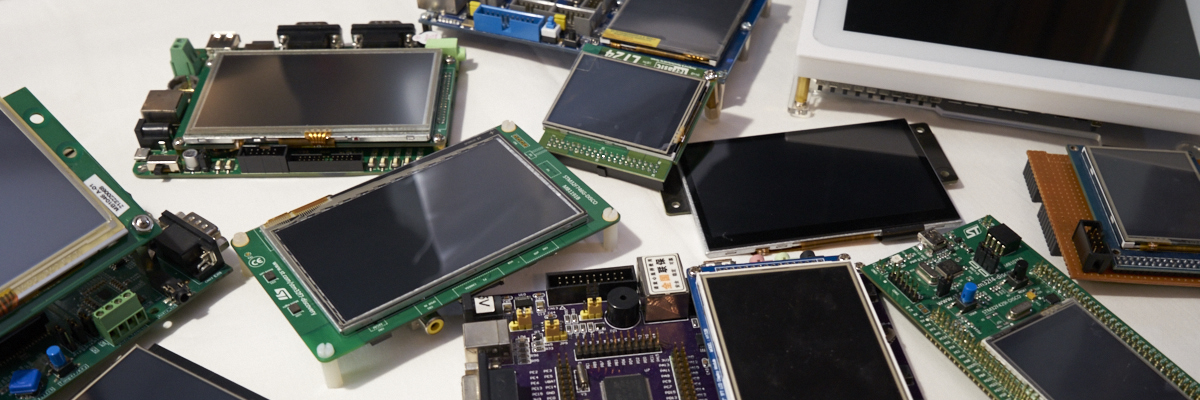-
Posts
2,656 -
Joined
-
Last visited
-
Days Won
2
Content Type
Forums
Store
Downloads
Blogs
Posts posted by Joel Bodenmann
-
-
This is definitely not an uGFX related problem.
Please open a new thread whenever you hit a new problem. This way we keep the forum clean and it is easier for people to find answers using the forum search.
I can try to compile it as well and point you to the actual problem then.
~ Tectu
-
It is recommended to copy the /drivers/gdisp/ILI9325/board_ILI9325_template.h file to your project and keep it's routines empty so you can see if everything compiles successfully first. This will save you a lot of trouble.
From there you just have to use the STM stdperiph library functions to control your microcontrollers peripheral. There is sadly no example/template available for this setup.
~ Tectu
-
Can you please post the full compiler log? I will try to test it tonight but I cannot promise you anything.
~ Tectu
-
You're welcome.
Feel free to open a new thread if you hit any problem / having a specific question.
~ Tectu
-
No problem.
Feel free to start a new thread when you have any problems.
~ Tectu
-
This thread / the post containing the link is over one year old. It is not possible to update every outdated link on the forum.
If you are searching for the current guide, you can find it here: http://wiki.ugfx.org/index.php?title=Getting_Started
~ Tectu
-
Hello Roman and welcome to the uGFX community!
1. Sadly we are not able to create a ready-to-use project for you as it takes a lot of time. However, the wiki is very detailed on what you need to do in order to get uGFX running. The forum is always there to ask specific questions.
If you are a commercial customers please contact us through the mail address that can be found here: http://ugfx.org/imprint
2. You do not have to use ChibiOS/RT when you want to use uGFX. There are many other already supported underlying systems such as FreeRTOS. However, you can really use it with any system. You can either use the raw32 port to use it bare metal (= without any operating system) or you can easily implement a new operating system port following our wiki guide.
~ Tectu
-
I like what I see so far

Keep it up!
~ Tectu
-
Glad to hear! Once "completed" we can put it on the official website if you like

~ Tectu
-
inmarket, either you or I have misunderstood his post. From what I got he will use uGFX and he's trying to put together a good project structure and he's asking us for advice.
~ Tectu
-
Hello LeMoussel and welcome to the community!
It looks like you are spending a lot of time and effort into this. So far it looks good. Is this going to become a tutorial-like guide?
Feel free to ask whenever you have any questions about the uGFX project.
~ Tectu
-
I can only confirm that there are huge quality differences in the TFT modules available. However, at the end you get what you pay for

It is also correct that µGFX does currently not support any image or shape rotation. However, this should indeed be added at some point in the nearer future.
Feel free to share your implementation with us and the community in case of you're going to implement it yourself.
~ Tectu
-
Hello juppeck
At first, i wondering why the GCC Compiler is prefered to use in combination of the worst IDE like "Eclipse" and their commons. To get the IDE works with the JTAG and the Environment Setup is done, a couple of hours could be passed. For a beginner in Cortex-M programming, the homogene IDE like µVision from Keil make the start easier.I agree with your statement that a homogene IDE such as Keil is a lot easier for beginners. I don't use Eclipse myself and I never understood why especially all the beginner tutorials seem to use it as it is rather difficult to set up.
However, Keil and other proprietary IDEs are not popular with beginners and DIY people as they have either a built-in size limit or are expensive (usually both). And when working with a graphics library such as µGFX, 32kB binary size really is not much.
Note that µGFX itself has no such thing as 'prefered Compiler' or 'prefered IDE'. We spend a lot of time and effort into keeping uGFX free from any IDE or compiler bindings. In fact, that seems to be one of the reasons why µGFX is so popular with commercial and DIY users. It is true that most of our DIY users are using GCC but this is simply due to the fact that it is free to use without any restrictions. Some of those users are either using the Makefile based system, Eclipse or CoIDE, now Em::Blocks seems to become popular as well.
Commercial users on the other hand seem to usually use either Keil or IAR, both of which work just fine with uGFX as well.
The next Point, same reason is the use of the CMSIS-Library and Std-Library instead Manipulation the bits directy. You must beware about the huge amount of available Registers and their names. A good example that demonstrate what i mean is the FSMC init Structure that Needs to be filled with valid Parameters. Every Screw thats required to be turn should be self described by a regular name.
Same as above: uGFX is held generic. It is not bounded to any underlying library. Therefore you can use whatever you like.
It is true that most of the example board files are ChibiOS/RT specific. The FSMC line that you posted comes from a ChibiOS/RT usage examples from quite a long time ago. Replacing it with your suggestion (which is indeed more readable) would force the user to include the Std-Library in the ChibiOS/RT settings which adds a huge overhead.
As a summary: You can use whatever you want and we don't expect you to face any issue. If you are having difficulties using a specific IDE or compiler, please let us know as we are interested in removing these kinds of boundaries

~ Tectu
-
How this can be raised was the question.
Usually there is nothing to do but optimizing the FSMC timings in the board file to archive a reasonable performance.
Well, my experiences with the 5" Type of this kinda TFT/SSD1963 with 800x480 Pixel Resolution works nice with about 28 FPS in combination with emWIN-5.24.2, an STM32F4-Discovery board.This is pretty much the same with uGFX. Benchmarks show that around 32 FPS are doable with this setup.
~ Tectu
-
Sorry for the late reply. I hit the post "Submit" button whilst being in the train it seems like I lost the signal there... Apologies.
I confirm that there is a problem with the defines (the warnings that you see). I will try to fix this tonight.
However, you are still able to create a successful build. Does it work for you? If not, can you describe the symptoms? (eg. does mounting work and just read() or open() fails etc).
~ Tectu
-
-
-
-
-
-
We are very curious, could you please tell us more about your display, it's purpose and probably show us a picture? We've never heard of such a display before.
~ Tectu
-
-
Glad to hear that everything is working for your now.
~ Tectu
-
The online converter should be working again. Can you please confirm this?
I am currently on the road and I cannot try to compile it myself right now. I will try it as soon as I am at home.
~ Tectu



Build project in ChibiStudio problem
in Support
Posted
Hi,
Can you please specify which version of ChibiOS/RT you are using?
I don't think that this is an uGFX related problem. I just compiled a project with ChibiOS/RT 2.6.6 and an STM32F103 as well. It worked without any problems.
Please make sure that you always use the ChibiOS/RT provided Makefile and just modify it as described in the wiki as they change sometimes.
~ Tectu